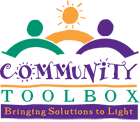
Who is the Health Extension Toolkit for?
The Health Extension Toolkit has been developed as a mechanism for states to begin collaborating around ever better ways to improve quality of care within their primary care practices while improving community health. Its intended audience is broad, including academic health centers, land grant universities, primary care divisions, community hospitals, Area Health Education Centers (AHECs), community health workers, departments of health, or Medicaid agencies, as a method of disseminating a model of health extension.
How is the toolkit presented?
Each module will have several topic areas, where brief information will be shared, linking to further information and resources if needed. Each topic area expands, like an accordion, to reveal the information within. As much as possible, multimedia will be used within these areas, including video vignettes, graphics of models and frameworks, and examples of useful materials. Links to these media will also be included at the end of each module, under “Related Literature & Tools”.
After the introduction to each module, key information is shared:
![]() Best Practices: Shares experiences from other states that users can use for learning how health extension is adapted in different regions and under various circumstances.
Best Practices: Shares experiences from other states that users can use for learning how health extension is adapted in different regions and under various circumstances.
![]() Key Contact: Rather than have to guess who to contact, each module has a one key person for users to reach in case of questions, comments, or contributions.
Key Contact: Rather than have to guess who to contact, each module has a one key person for users to reach in case of questions, comments, or contributions.
Repositories of all the literature, tools, and videos contained on the toolkit are grouped together for easy access under the “Quick Find” tab. You can also access these repositories by clicking the icons below:
Navigate the toolkit by using the tabs along the top menu bar, by using the “breadcrumbs” in the top left corner, or by using the buttons at the bottom of each page, which will take you through the toolkit from beginning to end, or back to the main “home” page:
![]()
![]()
![]()
How can I get technical assistance from experts?
Site visits to the states involved in this national movement, to see health extension in action, may also be useful, as can site visits from representatives from these states to your program in your own home state. Please feel free to contact us for more information. Click here to find key contacts for each participating state.
How can I give feedback or contribute content?
Please feel free to provide any feedback, suggestions, questions, or expressions of appreciation through our “Give Feedback” section. If you have useful materials or literature related to Health Extension that you would like included on the site, please send them via our “Contribute Content” section. We look forward to hearing from you!
This is a living, breathing, evolving toolkit, with contributions from those using site that are developing their own approaches to Health Extension.
The Toolkit’s “Health Extension Blog” has posts from users describing their experiences– take a look around and let us know what you think! You can comment on posts as a guest user, or request access to contribute content directly to the blog.
What about a glossary of terms?
Related Literature & Tools





